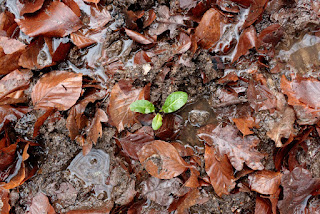 |
| 'there is a crack in everything, that's how the light gets in' Leonard Cohen |
Distance: 27.9 miles (47.1 total).
Total ascent: 1771ft (3723ft total)
Time: 10 hrs 9 mins
Where to begin? I could begin with all the bits of me that are hurting, but still chastened by my friend's parody of 'A Pilgrim's Cairn' (A Pilgrim's Cairn: The Pilgrim Parodied) I'm not going to do that... except to say that my feet have taken a pasting. Two days in, one of the frustrations of walking in Ireland is the lack of good old public footpaths. Today has been almost entirely road walking, which is good for my legs and good for the pace I can maintain, but it batters my feet.
Right now what I'm most aware of though is not my aching feet, but that I got through this leg in a reasonable time and in reasonable shape. This will be the third longest leg of the whole walk, and the second longest in terms of walking that I have to do with my full backpack on and I was a bit anxious about how it would go. I know I'm in good shape because I've just got up from my table to order a Guinness and not felt anything crack or pop, and not muttered even the mildest of expletives. The weather has been ideal; in fact, a little after Midday Prayer I had to stop to take a layer off because I was getting too hot. I say a mighty 'Ha!' to all the people who questioned why I was making this walk in January/February (I'm going to come to regret that mighty 'Ha!' before the pilgrimage is completed, I have no doubt).
The focus of this stage of the journey is Strove Beach, the place where Columba went into exile from his homeland of Ireland and began his journey to Scotland. Exile can take many forms.
We all need our truth-tellers, human mirrors. We need those people who can tell us that no, those clothes really don't suit us; tell us that we've got a stray eyebrow hair that really should be clipped; tell us that perhaps we should buy a packet of mints on the way to work, because we're still absolutely reeking from the garlic-heavy supper we enjoyed the night before. It's not always easy to hear what they have to say. Sometimes it can be downright painful to hear what they have to say. However, through years of experience and the belief that we're loved, we come to trust them even when we're slow to acknowledge that yes, they might have a point.
But what if our truth-tellers, our human mirrors, become like carnival mirrors which show us exaggerated, distorted reflections of ourselves? What if our truth-tellers become story-tellers, telling stories about who we are and who we were, which are fundamentally untrue? It can be so hard to reclaim the truth of yourself, because you have loved and believed the reflection that they have shown you for so very long. It can be so hard not to keep looking into that mirror, both compelled and repelled by the grotesque image it shows you. It can be so hard to face the truth that your truth-teller no longer is. It is a kind of exile.
It's an exile which reaches its nadir when you clothe yourself in that distorted image and become a stranger even to yourself.
What our heart needs is to be able to see ourselves through the eyes of God, the Truest Truth-teller. We need to look into the mirror that God holds up to us; to see ourselves for the loved, valued, children of God that we are. But how do we actually do that in practice? Religious texts, religious institutions, religious leaders, all have a long track record of holding up distorting mirrors to all sorts of people.
Where then do we find the true vision of who we are in the eyes of God?
I have my answers. What are yours? Use the comments section below to let people know. I hope that some of your answers are different from mine... our uniqueness is one of God's greatest gifts of all!
_________________________________________________________
Thanksgiving:
Usually at this time on a Friday night I'd be having a couple of pints with my good friends Charlie and John. I give thanks for both of them tonight. Especially I give thanks that Charlie was on the side of the angels, when I needed some angels on my side.






















